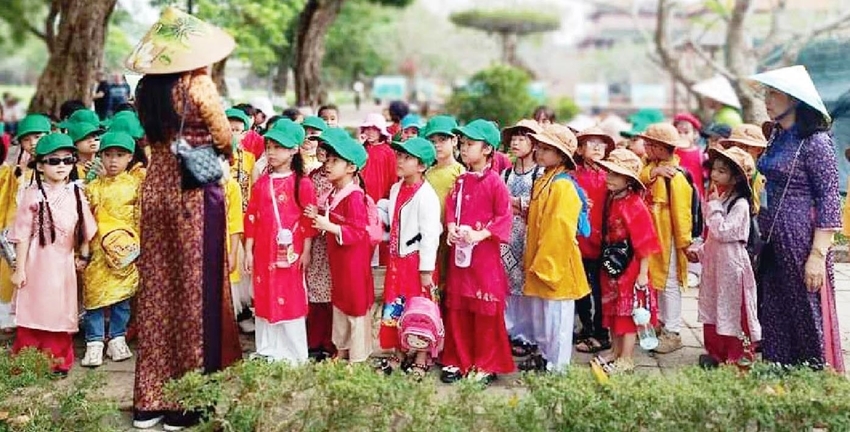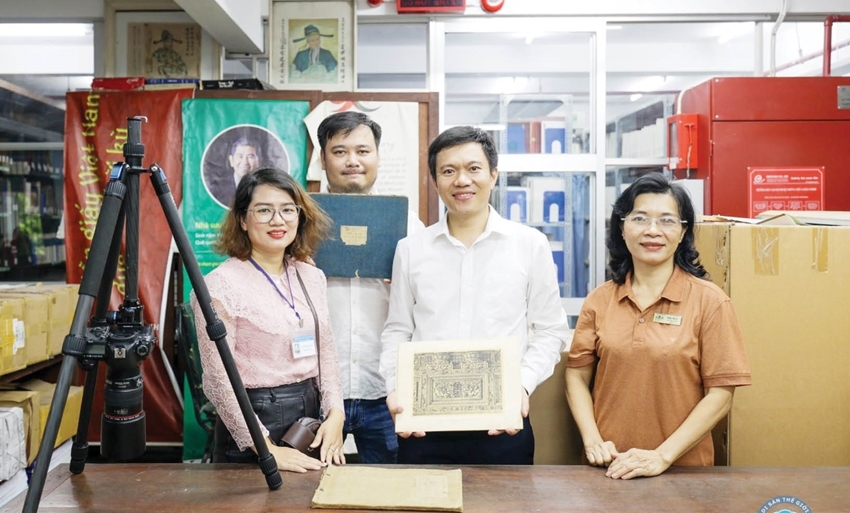 |
| The "Heritage - Culture - Art Education" program contributes to increasing school children's love for heritage right from childhood |
Love for heritage "awakened"
The center applies multimedia to the exhibition, narration and guiding visitors, and 3D scan of monuments to include them in virtual reality tourism.
The unit cooperates with the Korean IV COM Company in introducing the XR virtual reality experience entertainment service "Finding the Lost Royal Palace"; cooperates with the US CyArk-Seagate High Technology Group, the Digital Archive Center, and the Korean UnderDogs Group in carrying out several monument digitization projects: the Citadel, Khai Dinh Mausoleum, Tu Duc Mausoleum, An Dinh Palace.
The digitization projects aim at increasing the application of digital technology techniques to help improve the efficiency and accuracy of research, data storage, conservation, and restoration of architectural monuments using 3D models with an eye to proposing effective measures for protecting heritage in response to climate change.
According to Mr. Hoang Viet Trung, Director of HMCC, these data are also used to create entertaining virtual reality experiences to serve tourists and promote Hue’s images and cultural heritage to the world.
Also in this project, Tu Duc Mausoleum is the first Vietnamese monument to be digitized by Google Arts & Culture and CyArk in the Open Heritage project and widely promoted to the global public on the Google Map channel. Simultaneously, the above documentaries were also introduced on the local and national television channels and in some international forums and conferences.
 |
| Hue Monuments Conservation Center staff collect and digitize old documents at Ho Chi Minh Museum of History. Photo: HMCC |
“The effectiveness of these projects is shown in terms of advanced storage technology to help manage and preserve Hue monuments with 3D image models, propagate and promote Hue cultural values. These projects also take advantage of the capability of modern technology to enrich the knowledge of the social community, especially the young generation about Vietnamese history, culture, and architecture, "awakening" their awareness of protecting and contributing to the nation's cultural heritage," Mr. Trung said.
Or, at the Hue Museum of Royal Antiquities, heritage education is given special attention and stepped up in many forms. Through the "Heritage - Culture - Art Education" program, the Museum has been bringing enjoyable experiences, helping students always feel excited and increasing their efficiency in the process of accessing and acquiring cultural and historical information. It contributes to increasing their love for heritage and homeland right from childhood.
“Bridge” from digital transformation
As the management unit of Hue Monuments Complex, Royal Court Music of Vietnam, Documentary Heritage and environmental landscape associated with the monument complex, etc., recently, the HMCC has viewed digital technology application and DT implementation as one of the optimal solutions for preserving, promoting and taking heritage and cultural values to the regional and international level, bringing cultural heritage to the public.
The DT Project by the HMCC in the 2022 - 2025 period sets the following targets: Building the digital government services and system of mechanisms and policies; applying IT to business operations and added value creation.
Simultaneously, the application of IT and digital technology aims to meet the needs of sightseeing, discovering, increasing experience, and developing value-added services at monument sites, thereby creating new tourism values and products for developing tourism and promoting the potential and advantages of Hue culture and indigenous knowledge…
According to Mr. Hoang Viet Trung, many DT programs from the central to local levels have been implemented by the unit in the expectation of developing the HMCC into a center for researching, collecting data, and collecting ancient documents, systematizing full-text databases with the application of modern digital technology.
The unit implemented the data revision and systematization of more than 1,400 sets of records that were created, digitized, and included in the heritage's data software system; created a database on antiques; digitized and put into use QR codes for some monument sites; digitized the data system of works being restored and renovated, etc.
“The center not only focuses on the management, conservation, restoration, and promotion of heritage values but also boosts the application of modern science and technology, DT, and multimedia of Hue heritage images. This is an effective "bridge" that brings Hue cultural heritage closer to the public and helps to preserve the value of Hue heritage and culture, contributing to making a day-to-day alteration to the appearance of Hue Monuments Complex,” Mr. Trung said.